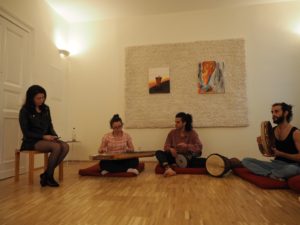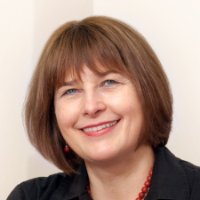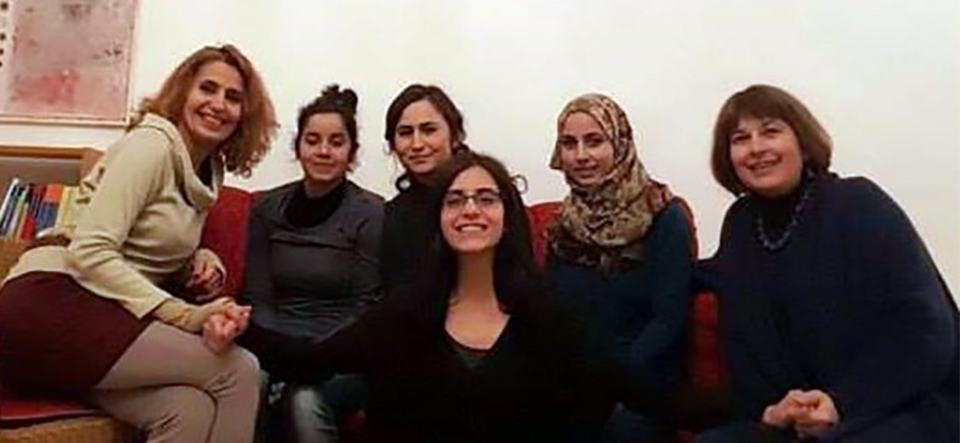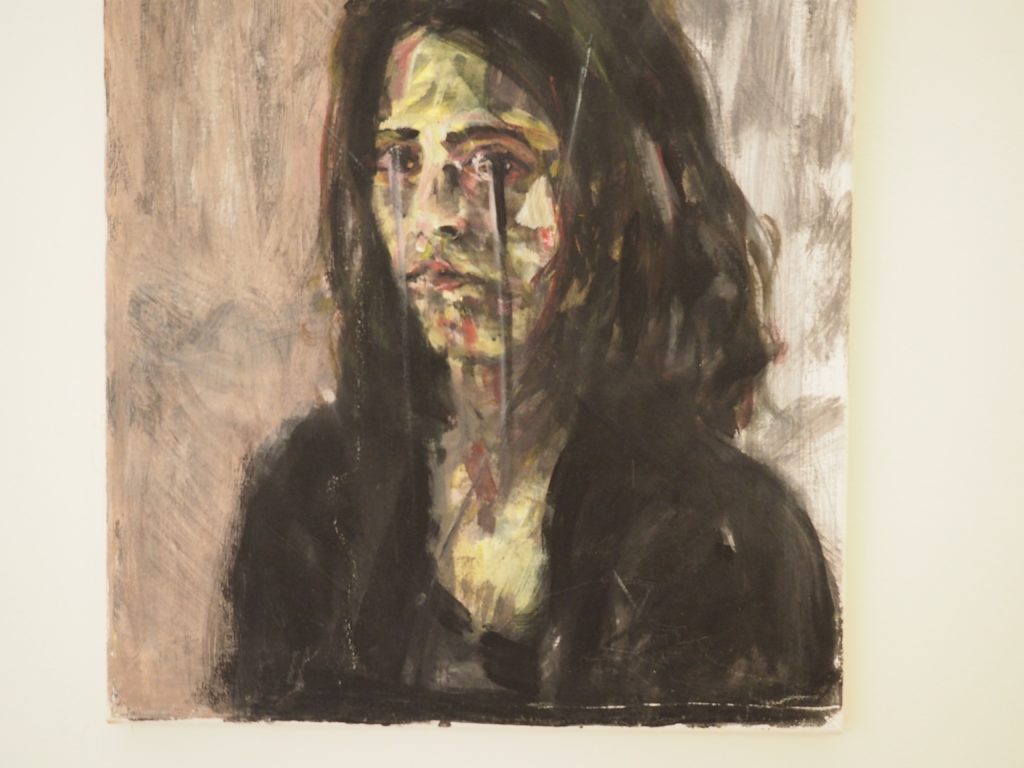Arwa (front, center) with Gabriele (R) and women of the Circle of Peace.
By Gabriele Blankertz, Berlin, Germany
Not Knowing & Bearing Witness
BERLIN, GERMANY. I was touched by all the pictures of the tragedy of the war in Syria. The terrible situation of refugees who took dangerous ways to find safe places, all the children, women and men, old and young who arrived in Germany exhausted and with nothing…It made me think of what I could do to help a little.
I lived in this crazy situation where I would not get in contact with refugees, even if I lived on the same street as them. I figured there was no reason to meet. Even if I had a reason, I would not ask someone in the street, “Are you a refugee?” In which language should I ask? I realized this separateness. Most people are living in this separateness, not seeing the other, with no contact to the other. This was my bearing witness to separateness.
To start with Not-Knowing meant to me to be open in mind, letting go of ideas of “refugees”, of “their needs”, of the right way to work with “refugees”, about how to finance the work.
First of all I wanted to come into contact with women and listen to their life experiences and needs, and this means deep listening, bearing witness. Out of this I wanted to offer what was possible for me as a human being and as a professional Gestalt and trauma therapist. My idea was to create a safe place, where women could come together to share their stories, support each other and find a way to stabilize psychologically in their everyday life affairs. I wanted them to become powerful enough to help others outside the circle.
Taking Action
But how to find a woman to translate? I don’t speak Arabic and I could not pay for a professional interpreter. I asked a man who owns a shop close to my practice– he is from Lebanon and has lived in Berlin a long time –if he knows a woman who might be interested in translating for such a project. After some weeks a woman called me and we met to get to know each other.
This woman was Arwa, at that time a young Artist of 23. She had finished her Bachelor in Art in Damascus and lived in Germany for one and a half years. Her life situation was difficult, but she wanted to support other women and help realize the idea of a Circle of Peace.
Now how to find women for the project? Sending my offer to institutions and dormitories for refugees, nearly no answers came. Arwa shared the idea with all the people she knew in Berlin, in her language school and through Facebook. This turned out to be the best way.
A Group Forming: The First Six Months
It was soon very clear that there was lot of mistrust and fear of me as a German therapist, and fear of discussing personal problems in a group. We started with single talks. Sometimes women were accompanied by a cousin or a social worker. During the first half year we had a lot of single talks, but at the same time we started with group meetings every two weeks.
The first woman I met with could not speak. She had lost her voice after hearing her boyfriend was killed by a bomb. When her parents wanted her to marry another man a year later, she went away alone from north Lebanon through Turkey, Greece and so on. A social worker accompanied her during the first visit, and later we started to organize a private meeting– friends of my daughter helped us. We painted a lot at that time. She loved to paint. Besides that, she wrote down what she had to say and she spoke with her eyes.
The next woman, I’ll call her R, was seventeen years old. She came with her cousin who wanted to check that the situation was safe. R was a shy woman who lived in a dormitory for refugees with her mother and three of her brother and sisters. Her father and older brother were killed. She also loved painting and it was very helpful that Arwa was close to her age. We started to create a familiar atmosphere, drinking tea, painting, talking, laughing.
During the first half year some women came and left. We started different activities. For example, we met with German girls because R wanted to know what they’d think about the refugees, especially about the women who wore headscarves. I invited the women to my home and they cooked an Arab Dinner together. We also visited R in her Dormitory during Ramadan. Her mother invited us to a Dinner.
The group stabilized and about six to ten women were regularly joining our weekly group meetings. Arwa organizes the group meetings on WhatsApp, so even those women who don’t have time to come can be part of the group and get all the information.
Lots of themes came up, a lot of shared stories. Many women suffer from unhappy or difficult relationships and to speak about this issue is very important to all of them. All the way from Syria these women had come, caring for people. There is one woman who cared for her three sons and her mentally ill husband. She traveled from Damascus to Algeria where she worked for one year with humanitarian organizations, giving trainings in NLP. In Berlin she separated from her husband: she is happy that he can get help and she can start a new, freer life.
Recently a new woman joined our group. She is a teacher and a mother of two children, and her husband was in prison for 18 years because of political activities. She had a hard time in Syria. When her husband was freed he went to Germany to get asylum, and she followed. But the destructive experiences he had in prison and the long time they had been apart alienated them. Lots of troubles arose and they got divorced. Now she starts a new life.
One other woman from the Kurdish territory has a family that’s spread over four countries: Germany, Turkey, Syria and Iraq. She is the only one in Germany. Her father and some brothers are in Turkey, where they went together. Her sister was very frustrated and getting more and more depressive, so she decided to go to Syria to join the PKK fighters. Her mother was so worried about this that she followed to Syria to bring her daughter back to Turkey, but the way was too dangerous so they went to Iraq hoping to find a way through the mountains. It was not possible and they are still in Iraq. There is no safety for her family, but she supports them by talking or writing via mobile. Yesterday she was very upset. We all listened. Together, all of us felt the sadness of how hard life is for so many people.
Deep Listening Is Loving Action

After one year the women wanted to share the idea of the “Circle of Peace” with their community. They wanted to show that it is helpful to talk with others and listen in a deep way, to show that things can change. So we organized an evening event and all the women invited friends and family. Some of their friends played music, and Arwa and another artist from our group showed the paintings they created during the last month. It was a wonderful evening with wonderful people.
During that evening some men asked for a Circle of Peace for male refugees, which I am organizing now. Another project also came up at that time: a training program for Arabic people who’d like to take more responsibility for others by practicing dialog. So we’ll organize a two-years training in “Dialog for Leadership”.
Since beginning this project, we realized that deep listening is loving action. As one woman said: “These meetings are like cooking. We all come hungry and leave well nourished. It is our kitchen”. We all agreed this is what happens.
To be with what is going on now includes silence as well as talking and laughing and crying. It is deep healing work.

Gabriele Anchi Blankerts is a member of the Zen Peacemakers living in Berlin, Germany. She is a Gestalt- and trauma therapist, Gestalt trainer, and mother of three.



